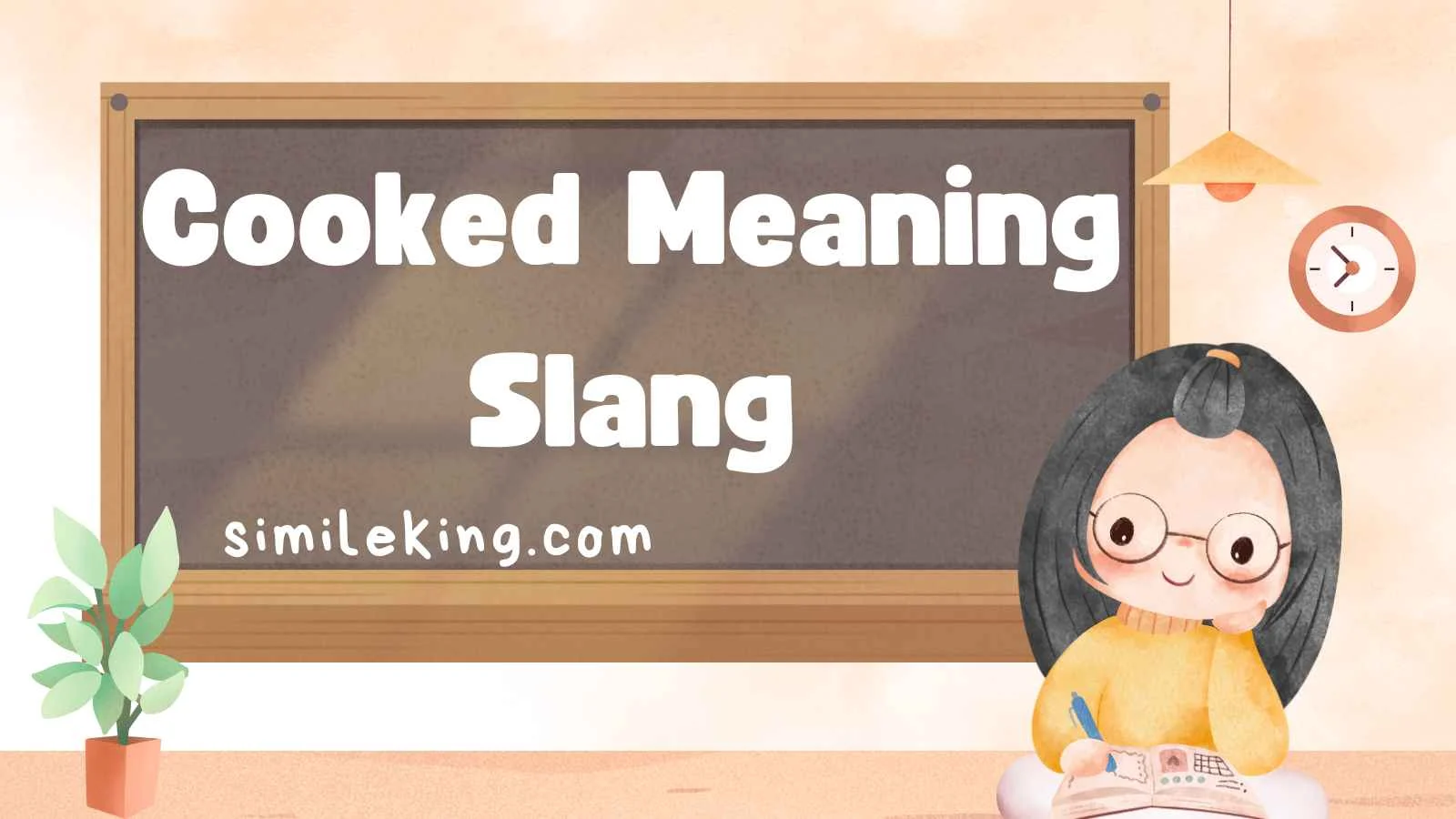Language is never static—it evolves constantly with culture, technology, and social interaction. Slang, in particular, moves faster than most forms of language. Words that meant one thing yesterday might shift in meaning today, especially as they circulate on platforms like TikTok, Instagram, and Discord. One of the most popular and versatile slang terms you’ll encounter in 2025 is “cooked.”
But what does cooked really mean in slang? How do you use it properly in text conversations, casual chats, or even in more professional or polite contexts? And when should you avoid it? This comprehensive guide dives deep into the slang meaning of “cooked,” explores its modern variations, and gives you 10 superior alternatives you can use depending on tone, setting, and formality.
What Does “Cooked” Mean in Slang?
Traditionally, cooked simply means food that has been prepared with heat. But in slang, especially in 2025, the word has developed several layered meanings depending on context:
- Exhausted or Burned Out
- Example: “Bro, I pulled two all-nighters this week. I’m cooked.”
- Here, cooked is shorthand for completely drained—physically or mentally finished.
- Messed Up or Ruined
- Example: “I forgot to save my project file before the crash. I’m cooked.”
- Used when someone has made a mistake that can’t easily be fixed.
- Intoxicated or High
- Example: “He was so cooked at the party last night.”
- Describes being under the influence of alcohol or drugs.
- Overwhelmed or Stressed
- Example: “With finals, work, and family stuff, I feel cooked.”
- Highlights the sense of being unable to cope with everything happening at once.
- Finished or Defeated
- Example: “Once they scored that goal, we were cooked.”
- Expresses the idea of being beaten or having no chance left.
These meanings overlap but share a core concept of finality, depletion, or breakdown. Whether physical, emotional, or situational, when something is cooked, it has reached a limit.
Why Is “Cooked” So Popular in 2025?
The rise of cooked in slang comes from several cultural forces:
- Short-form video culture: TikTok and Instagram Reels thrive on short, punchy phrases. Words like cooked are easy to say, meme-worthy, and instantly relatable.
- Shared burnout culture: As younger generations talk more openly about exhaustion, stress, and mental health, cooked has become shorthand for collective struggles.
- Flexibility: It fits many situations—whether joking about being tired after the gym or describing a disastrous day at work.
- Digital minimalism: People prefer concise expressions. Saying “I’m cooked” is shorter, trendier, and more impactful than “I’m feeling very exhausted right now.”
Tone and Context: When to Use “Cooked”
Understanding when to use slang correctly is just as important as knowing what it means. Cooked is versatile, but tone matters.
- Casual Settings: Perfect for conversations with friends, gaming communities, or group chats. Example: “That workout was brutal. I’m cooked.”
- Humorous Settings: Adds exaggeration for comedic effect. Example: “After one math problem, my brain is cooked.”
- Informal Professional Settings: Sometimes works in laid-back workplaces, but be cautious. Example: “That meeting left me cooked.”
- Formal or Polite Settings: Avoid slang like cooked when emailing professors, managers, or clients. Instead, use a refined alternative.
Professional, Polite, and Casual Alternatives to “Cooked”
While cooked is trendy, it’s not always appropriate. Below are 10 polished alternatives you can use depending on tone and setting.
1. Exhausted
- Best for neutral, professional, and academic settings.
- Example: “After the long conference, I felt completely exhausted.”
2. Burned Out
- Ideal for work and study-related contexts.
- Example: “I’ve been working nonstop for weeks, and I’m burned out.”
3. Overwhelmed
- Works in formal and empathetic conversations.
- Example: “I’m overwhelmed by deadlines and responsibilities this week.”
4. Drained
- Polite but casual; describes physical or mental depletion.
- Example: “I felt drained after hours of travel.”
5. Spent
- More conversational, but still professional.
- Example: “After the big event, I was absolutely spent.”
6. Defeated
- Expresses emotional or situational collapse.
- Example: “When the plan failed, I felt defeated.”
7. Wiped Out
- Informal but widely understood.
- Example: “That marathon left me completely wiped out.”
8. Fried
- Slightly casual but creative; used for mental exhaustion.
- Example: “After solving complex problems all day, my brain is fried.”
9. Shattered (UK-friendly)
- Common in British English, especially conversationally.
- Example: “I worked all night, and now I’m shattered.”
10. Depleted
- Polished, formal, and professional.
- Example: “My energy feels depleted after a demanding week.”
How to Choose the Best Alternative
Here’s how you can decide when to use cooked or one of its alternatives:
- With Friends: Stick to cooked or informal synonyms (fried, wiped out).
- With Colleagues: Use mid-level terms (drained, spent, burned out).
- In Writing (Professional): Choose polished terms (exhausted, overwhelmed, depleted).
- In Humor: Cooked shines in exaggeration—“After one push-up, I’m cooked.”
The key is audience awareness. Using slang with someone unfamiliar can create confusion. But choosing the right word strengthens clarity and tone.
Modern Examples of “Cooked” in Real Conversations (2025 Edition)
- Gaming Chat: “That boss fight was insane. I’m cooked.”
- Workplace Humor: “Back-to-back Zoom calls all day—I’m cooked.”
- Student Life: “Three essays due tomorrow. I’m cooked.”
- Social Media Caption: “Friday night after a long week = cooked.”
- Sports Context: “After that run, my legs are cooked.”
- Party Scene: “He showed up cooked and couldn’t stop laughing.”
- Travel Stress: “Two delayed flights later, I’m cooked.”
- Family Chaos: “Babysitting three kids? Yeah, I’m cooked.”
- Relationship Stress: “Another argument… my emotions are cooked.”
- General Humor: “One math problem down, and I’m cooked.”
Why Understanding “Cooked” Matters in 2025
Slang isn’t just fun—it’s a mirror of culture. Knowing what cooked means helps you:
- Connect socially: You’ll understand friends, coworkers, or memes better.
- Adapt communication: Choose between slang and polished alternatives depending on context.
- Stay updated: Language evolves rapidly; being fluent in slang keeps your communication relevant.
- Express precisely: Sometimes cooked conveys emotion in a way no other word can.
Final Thoughts
The slang term “cooked” in 2025 captures exhaustion, defeat, and chaos all in one powerful word. While it thrives in casual and digital conversations, understanding when to switch to polite or professional alternatives is essential. Words like exhausted, burned out, drained, or depleted not only preserve professionalism but also convey your meaning clearly.
In short:
- Use cooked for humor, relatability, and informal contexts.
- Use alternatives for professionalism, empathy, or clarity.
- Always consider your audience before choosing slang or formal vocabulary.
By mastering these nuances, you not only stay fluent in modern slang but also communicate with precision, grace, and adaptability.





